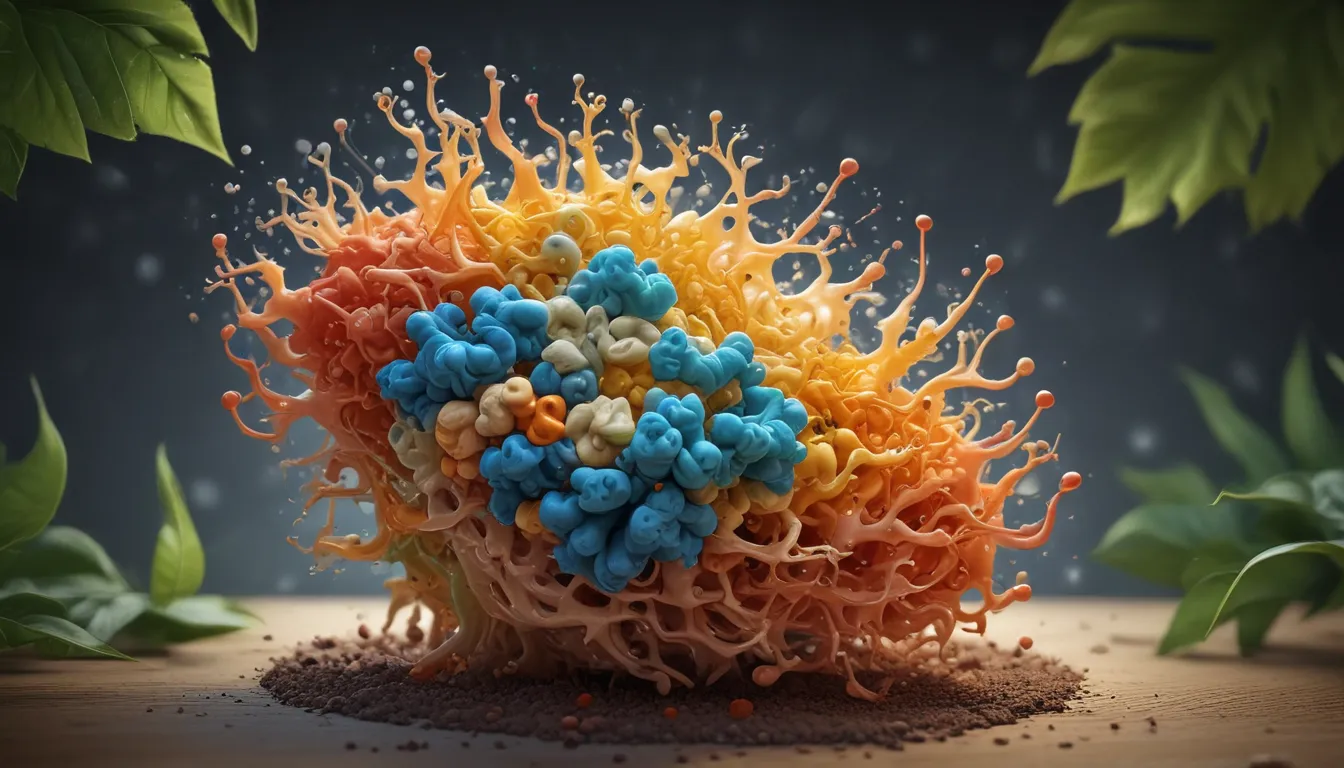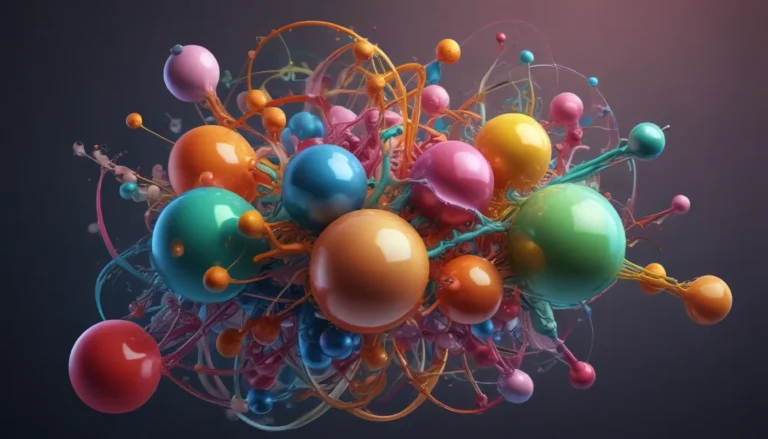A Note About Images: The images used in our articles are for illustration purposes only and may not exactly match the content. They are meant to engage readers, but the text should be relied upon for accurate information.
Enzymes are like the unsung heroes of the biochemical world, quietly orchestrating the chemical reactions that keep our bodies functioning smoothly. At the heart of enzyme activity lies the fascinating concept of the enzyme-substrate complex. This intricate molecular interaction forms the basis of catalysis, allowing enzymes to work their magic and speed up reactions within living organisms.
In this article, we will take a deep dive into the realm of enzymes and unravel nine mind-blowing facts about the enzyme-substrate complex. From the remarkable specificity of enzymes to the transient nature of the complex, we will explore the hidden secrets of this essential biochemical process. Join us on this enlightening journey as we uncover the mysteries behind enzyme-substrate complexes and gain a greater appreciation for the wonders of biochemistry.
Unlocking the Mysteries of Enzyme-Substrate Complexes
- Enzyme-substrate complex is like a special handshake between enzymes and substrates, making chemical reactions happen faster in living things.
- Enzymes are picky about their substrates, and their “hand-in-glove” fit allows for efficient and specific reactions in the body.
The Significance of the Enzyme-Substrate Complex in Catalysis
The enzyme-substrate complex stands at the center of catalytic reactions in biological systems. By binding to specific substrates, enzymes form this complex, which accelerates the rate of chemical reactions, ensuring that essential processes occur efficiently within the body.
The Specificity of Enzyme-Substrate Interactions
Enzymes showcase an impressive level of specificity when interacting with their substrates. Through mechanisms like the lock-and-key model or induced fit, enzymes only bind to substrates that perfectly complement their active sites. This precise recognition ensures that chemical reactions proceed smoothly and accurately.
Conformational Changes During Enzyme-Substrate Interactions
When a substrate binds to an enzyme, both molecules undergo conformational changes that facilitate the formation of the enzyme-substrate complex. These structural adjustments enable the reaction to progress smoothly, highlighting the dynamic nature of enzymatic interactions.
Weak Interactions Governing Enzyme-Substrate Complex Formation
The formation of the enzyme-substrate complex is governed by multiple weak interactions, such as hydrogen bonding and van der Waals forces. These subtle forces play a crucial role in stabilizing the complex and promoting efficient catalysis, showcasing the delicate balance within biochemical processes.
Modulation of Reaction Rates by Enzymes
Enzymes possess the ability to adjust the rate of a reaction by modifying their affinity for the substrate. Factors like pH, temperature, and the presence of inhibitors or activators can influence this affinity, ultimately impacting the speed at which the enzyme-substrate complex forms and the reaction proceeds.
Transient Nature of the Enzyme-Substrate Complex
Contrary to a permanent structure, the enzyme-substrate complex is a transient intermediate in the catalytic cycle. Once the reaction is complete, the enzyme releases the products and is ready to bind with new substrates, showcasing the dynamic nature of enzymatic activity.
Cooperative Binding Behavior of Enzymes
In certain scenarios, enzymes can exhibit cooperative binding behavior, where the binding of one substrate molecule enhances the enzyme’s affinity for subsequent substrates. This cooperative interaction optimizes substrate utilization and regulates enzymatic activity with precision.
Influence of Substrate Concentration on Complex Formation Rate
The rate at which the enzyme-substrate complex forms is influenced by the concentration of the substrate. Lower substrate concentrations may limit the rate of complex formation, leading to slower reaction rates and emphasizing the importance of substrate availability in enzymatic reactions.
Reversibility of Enzyme-Substrate Interactions
In some instances, the binding between an enzyme and substrate can be reversible, allowing the complex to dissociate back into its individual components. This reversibility provides a mechanism for the dynamic regulation of enzymatic activity, highlighting the adaptability of biochemical processes.
Delving Deeper Into the Marvels of Enzyme-Substrate Complexes
In conclusion, the enzyme-substrate complex emerges as a central player in biochemical reactions, orchestrating the conversion of substrates into products with precision and efficiency. By unraveling the intricacies of this molecular interaction, we gain a deeper understanding of how enzymes function and catalyze essential processes within living organisms.
FAQs
Q: What is an enzyme-substrate complex?
A: An enzyme-substrate complex refers to the temporary association between an enzyme and its substrate during a biochemical reaction, facilitating the conversion of substrates into products.
Q: How does the enzyme-substrate complex work?
A: The enzyme-substrate complex operates by the specific binding of the enzyme to its substrate, enabling the enzyme to catalyze the reaction by lowering the activation energy required for the conversion of the substrate into products.
Q: What is the importance of enzyme specificity in the formation of an enzyme-substrate complex?
A: Enzyme specificity is critical in the formation of the enzyme-substrate complex, as it ensures that the enzyme’s active site is uniquely designed to interact only with the specific shape and properties of its substrate, leading to efficient catalysis.
Q: Can enzyme-substrate complexes be inhibited?
A: Yes, enzyme-substrate complexes can be inhibited by inhibitors that prevent the interaction between the enzyme and substrate, thereby inhibiting the catalytic activity of the enzyme. This inhibition can be either temporary or irreversible.
Q: Are enzyme-substrate complexes involved in everyday life?
A: Absolutely! Enzyme-substrate complexes play a vital role in various biological processes essential for everyday life, such as digestion, cellular respiration, DNA replication, and hormone regulation. Without these complexes, these crucial processes would not occur efficiently.
Q: What happens if the enzyme-substrate complex is disrupted?
A: Disruption of the enzyme-substrate complex can hinder the progression of the reaction, leading to inefficiency or a lack of reaction altogether. Factors such as denaturation of the enzyme or changes in substrate/environmental conditions can disrupt the complex.
Q: Are all enzyme-substrate interactions specific?
A: Yes, enzyme-substrate interactions are highly specific, with each enzyme designed to bind only to certain substrates or groups of substrates. This specificity ensures precise and controlled catalysis of the desired reaction.
Q: Can the enzyme-substrate complex be reversible?
A: Yes, the enzyme-substrate complex can exhibit reversibility, allowing the products to dissociate from the enzyme after the reaction is complete. This reversible nature enables the enzyme to bind to new substrates and initiate subsequent rounds of catalysis.
Q: How is the rate of enzyme-substrate complex formation influenced by temperature and pH?
A: Temperature and pH can impact the formation of the enzyme-substrate complex, with extreme levels potentially disrupting the interactions between the enzyme and substrate. Maintaining optimal conditions is crucial for efficient complex formation and enzymatic activity.
Q: Who contributes to the accuracy and reliability of the facts presented here?
A: At our core, we prioritize delivering trustworthy and engaging content, with each fact contributed by real users like you. Our dedicated editors meticulously review each submission to ensure the highest standards of accuracy and reliability, ensuring that the information we share is both fascinating and credible.
Q: What other intriguing topics can I explore beyond enzyme-substrate complexes?
A: If you’re captivated by the wonders of enzyme-substrate complexes, be prepared to delve even deeper into the realm of Michaelis-Menten kinetics. Unravel the mysteries behind enzyme kinetics and witness how these intricate processes shape the very essence of life itself.
Embracing the Marvels of Enzyme-Substrate Complexes
Enzyme-substrate complexes stand as a testament to the remarkable efficiency and precision of biochemical reactions within living organisms. By understanding the nuances of these interactions, we gain valuable insights into the intricate machinery that governs life at a molecular level. Let the wonders of enzyme-substrate complexes inspire you to explore the boundless intricacies of biochemistry and appreciate the awe-inspiring world of biochemical science.






